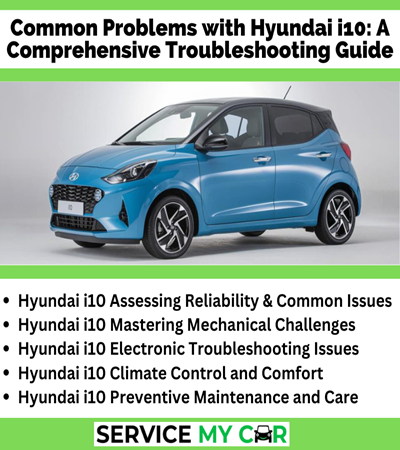The Hyundai I10, a popular city car, has garnered a reputation for being compact, efficient, and affordable. However, like any vehicle, it is not free from issues. This article aims to highlight some common problems associated with the Hyundai I10, providing potential buyers and current owners with valuable insights.
1. Engine Performance Problems
One of the most frequently reported issues with the Hyundai I10 involves engine performance. Owners have noted:
- Rough Idling: Some I10 models experience rough idling, which can be attributed to a variety of factors, including faulty sensors or fuel delivery issues.
- Loss of Power: Drivers have reported a loss of power during acceleration, often related to issues with the throttle body or fuel injectors.
- Engine Warning Light: The engine warning light may illuminate due to various underlying issues, from minor sensor faults to more serious engine problems.
2. Transmission Issues
The transmission system is crucial for the smooth operation of any vehicle. The Hyundai I10 has experienced:
- Delayed Shifting: Some users report that the vehicle hesitates before shifting gears, which can lead to a less enjoyable driving experience.
- Transmission Slippage: There are instances of transmission slippage, where the vehicle unexpectedly changes gears, posing safety concerns.
3. Electrical System Failures
Electrical issues can be particularly frustrating for I10 owners. Common electrical problems include:
- Battery Drain: Some I10s have been known to experience battery drain, often due to parasitic draws from the electrical system.
- Lighting Problems: Issues with headlights and taillights not functioning properly may arise, often related to faulty wiring or blown fuses.
- Air Conditioning Malfunctions: The air conditioning system may fail to cool effectively, often due to compressor issues or refrigerant leaks.
4. Suspension and Steering Concerns
Handling and ride comfort is a priority for a city car like the I10. However, issues have been reported:
- Noisy Suspension: Some drivers have reported a noisy suspension, which could indicate worn-out components such as shock absorbers or bushings;
- Steering Vibration: Steering vibration, especially at higher speeds, can be a sign of wheel alignment issues or imbalanced tires.
5. Interior Quality and Comfort
While the Hyundai I10 is designed for comfort and convenience, some interior quality issues have surfaced:
- Wear and Tear: Many owners have noted that the interior materials, particularly the upholstery, may wear out faster than expected.
- Noisy Cabin: Road noise can be pronounced inside the cabin, detracting from the overall comfort of the ride.
6. Fuel Efficiency Concerns
The Hyundai I10 is generally praised for its fuel efficiency, but some owners have reported:
- Higher Fuel Consumption: Instances of higher-than-expected fuel consumption can occur, often related to engine tuning or driving habits.
- Poor Fuel Economy in City Driving: While the I10 performs well on highways, some users experience less favorable fuel economy in urban settings.
While the Hyundai I10 is an excellent choice for urban driving with its compact design and fuel efficiency, it is essential to be aware of potential issues. Regular maintenance and being attentive to any warning signs can help mitigate many of these concerns. If you’re considering purchasing a Hyundai I10, it’s advisable to conduct thorough research and possibly consult with a trusted mechanic to ensure you’re making a sound investment.
By staying informed about these common problems, you can enhance your ownership experience and maintain the reliability of your Hyundai I10.

